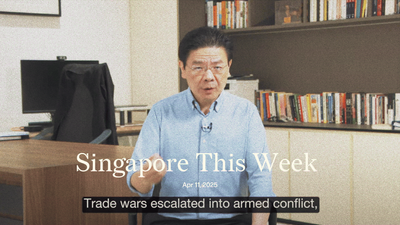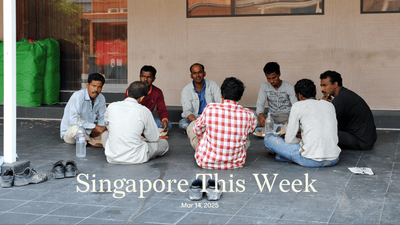Politics: The president makes all the right noises
In a choreographed opening of the second session of Singapore’s 14th Parliament, Halimah Yacob, Singapore’s president, repeated current talking points of the ruling People’s Action Party (PAP): a broader and more open meritocracy, the need for unity in a “troubled world”, fairness, inclusivity, and mutual support. She mentioned four “values” that will shape the government’s agenda: expanding opportunities for all; strengthening social safety nets; building a smart and liveable city; and deepening a sense of shared identity. Much of this has already been wrapped into Forward Singapore, the signature campaign of the so-called “4G” (fourth-generation) of PAP leadership, led by presumed next prime minister, Lawrence Wong. Supporters of Wong—who, unusually for a minister, did not attend a brand name high school—believe he means it; they’re not just pleasantries for a disillusioned electorate in one of the world’s most unequal societies. Critics say he can’t change the PAP’s inherent elitism, aversion to redistribution, and paranoia about losing control. Halimah’s election in 2017, after all, was anything but fair and inclusive. She won in a walkover after the government limited the contest only to ethnic Malays and then declared that only she qualified. Many suspect the PAP won’t allow her to run for re-election later this year, fearing she might lose to a non-Malay candidate. (This next election, due by September 13th, is open to all ethnicities.) If that happens then this address will be remembered as a microcosm of poor Halimah’s usefulness to the Men in White: a mere stooge.
Society: Counting down to 18
“Never mind, I’ll just wait till my 18th birthday,” a teen told his counsellor, rejecting treatment for anxiety because parental consent was required. Though there’s no law for it, most mental health treatment providers follow a general rule that those under 18 should have parental consent before receiving any form of therapy or counselling. Some providers are now calling for the removal of this rule for those above 14. “In the absence of clear and practical legislation or guidelines, mental health professionals may find themselves practising defensively,” says child psychologist Christine Kwek. But in some cases, parents could be the very source of distress, and a good few may not even believe in the need for mental health treatment—“Western therapy doesn’t work on Eastern minds.” These deterrents make treatment inaccessible for some Singaporean youth. Globally, this minimum age of medical consent varies, even between states: in Australia, an average of 14; in the US, anywhere from 12 in California to 16 in Tennessee. In the UK, those under 16 can consent to their own treatment if they pass the Gillick competency test, which assesses an individual’s maturity and ability to fully understand what’s involved in their treatment. Some Singaporean organisations like Limitless are already using the Gillick test in cases where parental consent is not possible. Flexibility with the parental consent rule will allow for a more nuanced approach to treatment. Hopefully our youth will feel more encouraged to seek early treatment, instead of rejecting much needed intervention out of fear.
Society: Grab a bag of bug grub
New sources of healthier and nutrition-dense protein will be winging their way onto diners’ plates. The Singapore Food Agency (SFA) will allow 16 species of farmed insects, like crickets, silkworms and grasshoppers, for human consumption in the second half of the year. Safety is paramount: products are treated to remove pathogens and are packaged properly. SFA also advises against ingesting them live or raw. If the idea of entomophagy, or eating insects, bugs you, history might change your mind. Our hunter-gatherer ancestors ate them, so did the ancient Romans and Greeks. Aristotle, fourth-century Greek philosopher, waxed lyrical about the best time to harvest cicadas in History of Animals: “The larva, when it has increased in size in the ground, becomes a “mother-of-cicada” [nymph]; and that is the time when they are pleasantest to eat, before the integument [husk] is broken…To begin with, the males are tastier to eat, but after copulation the females, because they then contain white eggs.” Scientists have noted that there are some 1,500 edible insect species worldwide. About 3,000 ethnic groups practise (what’s called) entomophagy. Insects are traditional food (even delicacies) across Africa, Asia and Central and South America. Taken a squeamish bite out of a deep-fried cricket (jing leed) in Thailand—best chased down with lots of ice-cold beer—as a traveller’s rite of passage? Also, termites in Africa, dragonflies in Bali, scorpions in China and fire-roasted tarantulas in Latin America, anyone? And while there are societies in Europe and the US that consider eating insects taboo and primitive, alternative food start-ups are trying to break psychological barriers by processing insects into everyday snacks and staples, like crisps, protein bars, flour and pasta. With an estimated nine billion mouths to feed by 2050, perhaps the pressure to boost food security and sustainability will help overcome the “yuck factor”.
Arts: The search for an NMP
Nominations are now open for the nominated members of parliament (NMPs)—a scheme Arun Mahizhnan described in 2011 as fraught with “inherent contradictions” (and one that Jom believes is undemocratic and ineffectual). They sit with elected officials in Parliament but enjoy relative freedom as they are not subject to a party whip. NMPs ideally represent fields like arts and letters, sports, and the labour movement and provide Parliament with community-specific views that elected MPs might not. And while these communities may design their own processes to nominate individuals, the ultimate decision lies entirely with an eight-member Special Select Committee made up of elected MPs and chaired by Tan Chuan-Jin, the speaker. The arts community has held town halls to select their own NMPs since 2009, when then-artistic co-director of The Substation, Audrey Wong, was endorsed. (The format has since inspired environmentalists.) Wong served until 2011. This process hasn’t always been successful. In 2018, the Select Committee disregarded the two candidates endorsed by the arts community, Felicia Low and Woon Tien Wei, and appointed Terence Ho instead. Ho had not participated in the town hall. For the subsequent term, the arts community put up three names (Audrey Lim, Nabilah Said, and Terence Tan) but ultimately none were selected by the committee. During this year’s town hall, one candidate expressed interest in the role: Noorlinah Mohamed, a veteran theatre practitioner and educator. In her speech at the town hall, Noorlinah detailed her extensive experience in the art scene as well as her time supporting previous Arts NMP Janice Koh. Her full statement can be read on the Arts NMP Secretariat’s website. Members of the public may indicate their support for Noorlinah via this form until April 17th.
Arts: Journey By Lorry
It’s 2023 and migrant workers are still being transported between their dormitories and their work sites by lorries. These lorries are, in the words of Amy Khor, senior minister of state for transport, “not designed for seat belts.” It’s unsurprising then that there have been multiple injuries and fatalities stemming from this mode of transport, chosen over buses because it’s currently the most (Khor again) “efficient”. Last year, an arts competition was organised for migrant workers to respond to the theme “Journey by Lorry”. It was jointly organised by Md Sharif Uddin and Ripon Chowdhury, both migrant workers and writers from Bangladesh, and G. Kethlyn Gayatiri, a Singaporean educator. After a successful exhibition of the winning work at The Projector X: Riverside Point, the Journey By Lorry team has collated contributions into a magazine. Proceeds from sales will fund future workshops and events like the upcoming introductory photography course for migrant and foreign domestic workers. To commemorate the magazine’s publication, the team is holding a launch event on April 23rd. The event will double as a Hari Raya celebration for Muslim migrants as well. The information about the event, as well as Journey By Lorry’s future plans, can be found on their Facebook page.
History Weekly by Faris Joraimi
We have entered the last 10 nights of Ramadan, which Muslims hold to be the month’s climax. Intensifying their ritual devotions, Muslims hope to reap the blessings of one special night in particular, whose exact timing is unknown: the Night of Power (Laylat al-Qadr in Arabic), when God is believed to have first spoken to Muhammad through the angel Gabriel, on a mountain overlooking Mecca. It’s the foundational event of Islam, and the reason why Ramadan is holy. Malays call these 10 nights “malam likur”, from a now-archaic Malay word meaning “twenty”, for it starts on the 21st night; so they’re referred to as malam satu likur (twenty-first night), malam dua likur (twenty-second night), and so on. Traditionally, this has also been when Malays start to put up festive lights in anticipation of Hari Raya. In the Riau islands and coastal Sumatra, large structures comprising little oil lamps called “lampu colok” are constructed usually on malam tujuh likur, the 27th night which many consider the most likely candidate for the Night of Power. These structures take on the form of mosques or gateways, gleaming sculptures of light visible from a distance. Malays in Singapore used to set up lampu colok in their kampung yards, but these disappeared with resettlement in the 1980s. By the 1990s, one writer in Berita Harian was already reminiscing the lost sight of colok lamps “scattered like pearls in a dark sea” on evenings in Kampung Kaki Bukit. It’s hard to imagine the lamps surviving our fire safety regulations, so electric string lights replaced them. Called lampu kelap-kelip or lap-lip, whose very name evokes how they twinkle in different colours, you’ll find them on windows and corridors outside a Muslim home.
Tech: Singapore specifies the foreign tech talent it wants
Do you work in agritech, financial services, the green economy, healthcare, ICT (information and communications technology), or the maritime sectors? Singapore wants you. Applicants in these sectors can earn up to 20 bonus points, making it easier to qualify for an employment pass (EP). Tan See Leng, manpower minister, provided greater clarity on the eligibility criteria for the new COMPASS framework to evaluate foreign professionals looking to work in Singapore. The updated EP scheme aims to address the tech talent crunch in ICT, with nearly half of the 27 jobs listed in the Shortage Occupation List (SOL) belonging to this sector. Furthermore, experienced ICT professionals—including AI and data scientists, cloud and cybersecurity specialists, and software developers—who meet the criteria are eligible for a longer five-year pass. The initiative underscores the government’s commitment to attracting skilled tech professionals to bolster Singapore’s innovation and digital capabilities.
Tech: A Singapore fintech unicorn bolsters executive bench as it goes global
Nium recently strengthened its executive bench: Anupam Pahuja is its new executive vice president and general manager for Asia Pacific, the Middle East, and Africa. Pahuja was formerly CEO of Vietnamese e-wallet start-up ZaloPay, which is owned by Vietnamese gaming giant VNG. Nium also appointed Volker Steinle as senior vice president and general manager of the Americas. Steinle formerly led all commercial activities in North America for Adyen, contributing to more than 25 percent of its revenue in 2021. Both Steinle and Pahuja will report to Prajit Nanu, Nium’s founder and CEO. These appointments reflect the importance of internationalisation for the fast growing fintech company, which offers banks, payment providers, and businesses access to global payment and card issuance services, facilitating transactions in 35 markets such as Australia, the UK, the US, and across South-east Asia. Nium is already a regional fintech giant. Given its current trajectory, it may one day compete with global fintech giants like Stripe and possibly pursue a US listing.
Tech: Keeping it in the family
SoftBank Ventures, the venture arm of SoftBank Group with approximately US$2bn (S$2.7bn) funds under management will be acquired by The Edgeof, a Singapore-based VC firm led by Taizo Son, the youngest brother of SoftBank Chairman Masayoshi Son. Amidst a more challenging macroeconomic environment, SoftBank has retreated from making eye-grabbing, high-risk investments such as Alibaba, Uber and WeWork to support some of its struggling portfolio companies. In February, SoftBank saw a net loss of 783bn yen (roughly S$7.8bn) for the third quarter of financial year 2022 as its venture funds continued to struggle. While the completion of the acquisition hinges on regulatory approval this year, the new combined entity is set to focus on critical issues such as climate change and sustainability. This marks the first known acquisition of a VC fund in the last two years in Asia since the market downturn. Could this be the start of more acquisitions as large funds begin to recalibrate their focus and the market consolidates?
If you enjoy Jom’s work, do get a paid subscription today to support independent journalism in Singapore.








